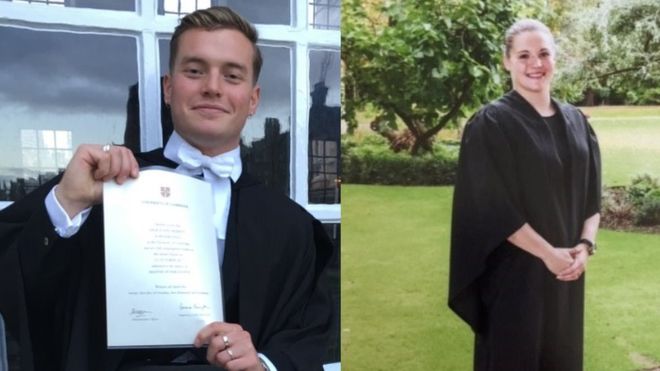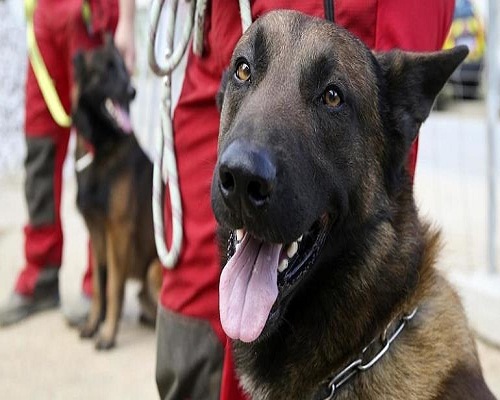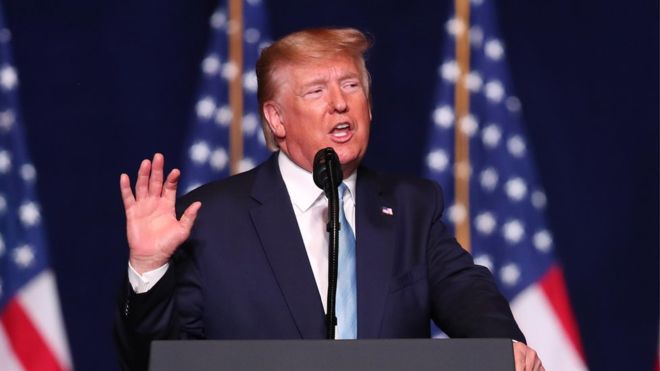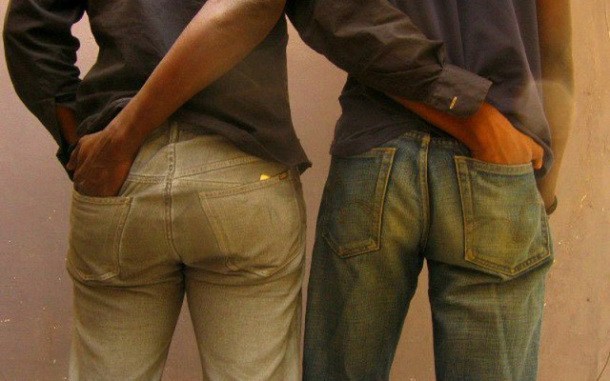London Bridge: Woman killed in attack named as Saskia Jones

The woman killed in Friday’s London Bridge attack has been named by police as Saskia Jones.
The 23-year-old Cambridge University graduate, from Stratford-upon-Avon, was fatally stabbed alongside another ex-student, Jack Merritt.
The boss of the venue where the attack began which killed the pair said “the building turned into a nightmare”.
Toby Williamson, of Fishmongers’ Hall, said staff who fought attacker Usman Khan believed he was wearing a bomb.
Two men took chairs, fire extinguishers and narwhal tusks, which were hanging on the wall, to fend off Khan, driving him out of the building.
Khan, 28, a convicted terrorist who was released from prison in December 2018, was later shot dead by police on London Bridge.
The families of Mr Merritt and Ms Jones have both paid tribute to their loved ones.
In a statement, Mr Merritt’s family described him as a “talented boy” who “died doing what he loved”.
“Jack lived his principles; he believed in redemption and rehabilitation, not revenge, and he always took the side of the underdog.
“Jack was an intelligent, thoughtful and empathetic person.
“We know Jack would not want this terrible, isolated incident to be used as a pretext by the government for introducing even more draconian sentences on prisoners, or for detaining people in prison for longer than necessary,” the statement read.
Ms Jones’ family said their daughter, from Stratford-upon-Avon in Warwickshire, had a “great passion” for supporting victims of criminal justice.
“Saskia was a funny, kind, positive influence at the centre of many people’s lives,” the family statement read.
“She had a wonderful sense of mischievous fun and was generous to the point of always wanting to see the best in all people.
“She was intent on living life to the full and had a wonderful thirst for knowledge, enabling her to be the best she could be.
“This is an extremely painful time for the family. Saskia will leave a huge void in our lives and we would request that our privacy is fully respected.”
Cambridge University’s vice-chancellor said he was “devastated to learn that among the victims were staff and alumni”.
Professor Stephen J Toope said the victims were taking part in an event “to mark five years of the university’s Learning Together programme” – which focuses on prisoner rehabilitation.
He added: “What should have been a joyous opportunity to celebrate the achievements of this unique and socially transformative programme, hosted by our Institute of Criminology, was instead disrupted by an unspeakable criminal act.
“Among the three people injured, whose identities have not been publicly released, is a member of university staff.
“Our university condemns this abhorrent and senseless act of terror.”
Speaking to the BBC, Prof Toope said the fact Mr Merritt was killed by someone he was trying to help “is the greatest tragedy of all”.
“I have profound sadness for the family,” he added.
“This is an attack on our community and it was intended, in such, to produce a form of terror and sadness – and it has clearly done that.”
Speaking about the chain of events inside Fishmongers’ Hall on Friday, where Khan launched his fatal attack, chief executive Mr Williamson praised the bravery of his staff who intervened to stop the attacker, hailing their actions as “extraordinary things done by ordinary people”.
“There was a scream, there was blood. People thought it was an exercise at first,” Mr Williamson told the BBC.
He recounted how two men, named as Lukasz and Andy, “used fire extinguishers, chairs and narwhal tusks ripped off the wall” to take the fight back to Khan
“They took a decision, one that enough was enough. They were determined it wasn’t going to go on.”
“They are two of the most humble people… but in the heat of the moment, people do extraordinary things.
“I am very proud to know them.”
Earlier in the day, hundreds attended a service at Southwark Cathedral for the victims of Friday’s attack on London Bridge.
The Dean of Southwark Cathedral, the Very Revd Andrew Nunn, said many people were struggling with what happened.
On Friday, the cathedral was put into lockdown as people ran away from London Bridge.
As crowds ran towards the cathedral, Mr Nunn recalled having “that sense of déjà vu”, adding that it brought back memories of the nearby attack in Borough Market two years ago, which left eight dead and 48 injured.
Speaking at Sunday’s service, Mr Nunn said “memories have been stirred and wounds have been re-opened”.
He added: “What seemed to have been put to the back of people’s minds has now been brought to the fore.
“We have to stand with them. We have to help bear their pain but also speak to that pain with words of hope.”
Mr Nunn, too, praised the bravery of the people who confronted Khan as he carried out his attack.
“Every event of this nature produces stories of such selfless acts of bravery.”
Dr Vin Diwaker, medical director for the NHS in London, gave an update on the conditions of the three people who were injured in the attack.
He said: “One of the people injured in the London Bridge incident has now been able to return home.
“Two people remain in a stable condition and continue to receive expert care in hospital.”
Over the weekend counter-terrorism officers searched a house in Stafford linked to Khan and another property in Stoke-on-Trent.
On Sunday night, Staffordshire Police said a 34-year-old man was arrested in connection with a “review of existing licence conditions of convicted terrorism offenders”.
The man was arrested on suspicion of preparation of terrorist acts, but Staffordshire Police added there was no information to suggest the man was involved in the London Bridge attack.
Friday’s attack comes after the UK’s terrorism threat level was downgraded on 4 November from “severe” to “substantial”, meaning that attacks were thought to be “likely” rather than “highly likely”.
The terror threat level is reviewed every six months by the Joint Terrorism Analysis Centre, which makes recommendations independent of government.
BBC





